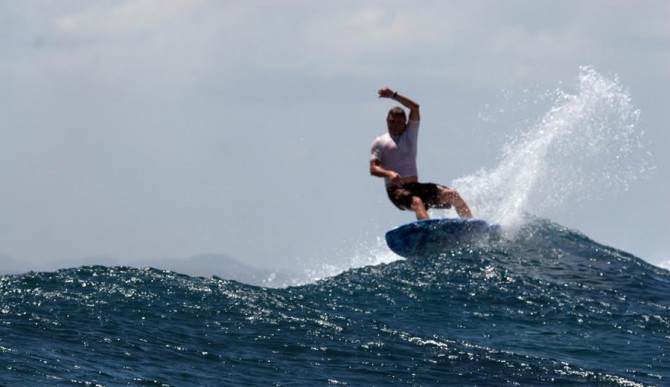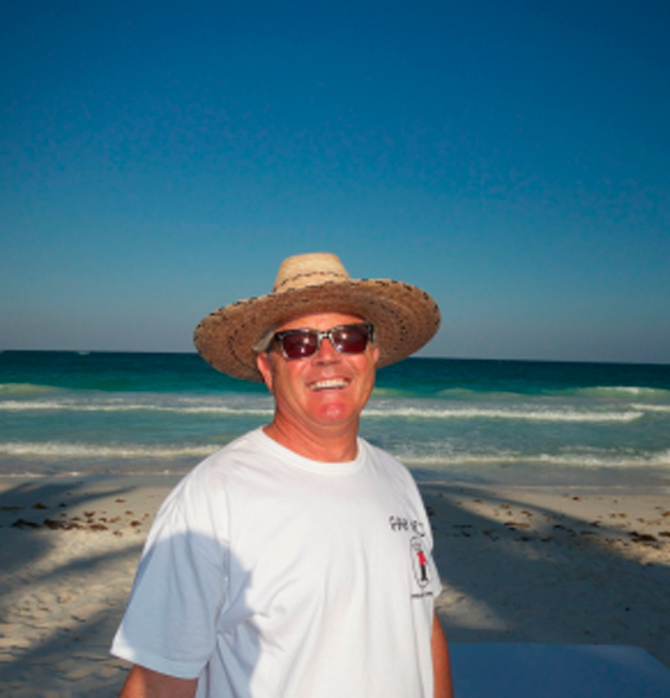
Not a bad day at the office… Photo: Courtesy of Joe Knoernschild
It’s every surfer’s dream, right? Actually, I take that back — going pro is every surfer’s dream — but this would be a close second. I’m talking about turning your beloved surfing lifestyle into a career. Not just a career that barely pays the bills and earns you a few extra hours in the water when the swell is pumping, but a career that lands you financial freedom, flexibility and happiness. It almost sounds too good to be true, but Hurley co-founder, Joe Knoernschild was able to do just that.
I was lucky enough to sit down with Joe in his Palos Verdes home to discuss his journey, experiences and thoughts on the current direction of the surf industry. If you’re interested in becoming a surfing entrepreneur, I have some good news for you. According to Joe, the time is now, but being creative is key. You’ll have to read on to learn more.
Kevin Tighe: Walk us through your career in the surf industry.
Joe Knoernschild: I was teaching seventh and eighth grade, managing Hurley Surfboards and waiting tables. I still managed to surf everyday.
I was also importing surfboards from California to Japan. My wife, Cindy, is 3rd generation, Japanese-American. At the time, her brother was teaching english in Japan. He saw the surf scene exploding over there, and came to me about exporting boards from California to Japan. I got the exclusive license from an umber of shapers to export their boards to Japan. International trade was such an invent industry. We were fulfilling a need because no one was doing it.
Then, in 1983, we approached Gordon and Rena Merchant (founders of Billabong Australia) and were able to acquire the license for Billabong USA. After 15 years, we notified Billabong that we would not be renewing our license due to creative differences, and would be starting Hurley. In the final year, we worked on both Billabong and Hurley. It was extremely hard on our team of 150 dedicated employees. Everyone constantly worked twelve to sixteen hour days, but it made the transition [to Hurley] smooth.
In 1998 we were at about $70 million with Billabong. In 1999, we projected anywhere between $5 million and $15 million in revenue for Hurley. By the grace of god, our first year at Hurley saw $25 million in revenue. Hurley caught fire, and we began courting NIKE in 2001. The company was acquired by NIKE in 2002.
What was the culture like at the company pre-NIKE and how did it change after the acquisition?
We were all passionate, but the reality was that we really just wanted to surf. It was so much fun to be able to come in at 5 a.m. and work ’til 10 a.m. when the tide switches. Go out at 40th St when it’s empty. Then come back and work ’til 7 or 8. We were the poster children for cult branding. There would be wetsuits hanging in the trees, and we had a skate ramp in the back. The loyalty we got by letting employees surf at will was astounding. These guys would take a bullet for the company. I’ll always remember the time the shippers caught another employee stealing, and they beat him up! I don’t condone violence, but everyone had each other’s back.
NIKE was really respectful of the DNA of the company, and I enjoyed working with them. They were scintillatingly smart. I recall a time when NIKE was upset by some of the inefficiencies. We received a memo saying “Do not hang wetsuits in the trees!” We put up a fight, and that was rescinded pretty quickly. One big change was that NIKE moved production offshore. From 1985 to 2003 production for Billabong and Hurley was in Los Angeles and Orange County
Internally (within the Hurley team), there is a lot of truth to money changes everything. People’s motivations turned more toward chasing the money. Surprisingly, that wasn’t a product of NIKE. They were always encouraging us to keep the uniqueness of what made our brand. I don’t think we were motivated by the money, but of course, we enjoyed the hunt. I don’t want to minimize the needs for all the operational details and financial planning, but the primary motivation was our passion. After NIKE came in, it seemed that the joy departed, at least for me and a number of other partners. However, fingers can’t be pointed at NIKE. My contract with NIKE was for four years, and I left after two.
What was the surf industry like during the early days and how has it changed?
Back then, it was a good ol’ boys club, and all the relationships were so organic. We surfed together and did business together. The industry was so new and there was so much opportunity.
Today, the wholesale model is broken. The retailers have all the power and shift the risk to the wholesalers. Because of this, the manufacturers can’t take risk, and it’s taking the fun out of it, along with the profits.
Now a days, you’re going up against the big corporate types, but this also creates opportunity. Look at Quicksilver’s replacement for Bob McKnight, it’s shocking. Does he understand surfing, do his roots go deep? In general, the industry has put more of an emphasis on metrics and monetization. Because companies, like Quiksilver, have become so large, they have a fiduciary responsibility to focus on profits. They’ve had to compromise many of the core values which made them successful in the first place, and have lost touch with their customer. Surfing has always stood for rebellious, outside the box thinking and strategies. Within the industry, culture and creativity has been sacrificed for the dollar. Surfing is something that is sacred and that value shouldn’t be given away for the all mighty dollar.
I know this sounds negative, but I’m truly optimistic. It’s like the late 60s early 70s again. It’s time for someone to come in and really shake up the industry.
Our time at Billabong was a unique period, but I also feel like we are in a really unique period now. Seeing all of the opportunity makes me feel like a little kid again. You just have to be creative and think outside of the box. The industry is ripe for an Elon Musk type to come in and usher the industry into a new realm.
What do you think has caused this change?
There has been and still is so much inbreeding in the surf industry, and I’m totally guilty of this as well. There is this thought that people outside the industry “aren’t cool,” and it’s this way of thinking has really put the surf industry behind the curve. We all think we’re so cool that we don’t look outside our industry for inspiration. When I have spoken to my fellow surfers in the “industry”, most seem to be woefully ignorant of what’s going on in the worlds of companies that are driving innovation like GOOGLE and SpaceX. It’s a bit strange, as the industry knows from the metrics that they are pretty much in the doldrums, but – there’s a loss at how to get the wind to fill the sails again. I believe the future of the industry is bright, and we’ll see the paradigm shift happen here soon. My two cents. Smart creatives that surf and really live the lifestyle hold the key [to the industry’s future].
What quick tips would you give to surfers looking to build a business around their surfing lifestyle?
1. Love the lifestyle, don’t be a poser.
2. Surround yourself with people that are way smarter than you. It’s a cliche, but it’s really true.
3. Make sure you take care of your people, compensate them accordingly.
4. Think global, act local. NO inbreeding!
5. Mind your business; meaning don’t be afraid of being empirical of the numbers and the business, but don’t let them control you. They are highly necessary. If you fail to plan, you plan to fail. So many people in creative industries shy away from the numbers and then crash.
6. You have to make sure everyone is sitting at the table. You can’t start a company and not have all the bases covered: design, production, finance, operations, sales and marketing. If there is a weak link, it will kill your company out of the gates. There has to be alignment and it can’t be sacrificed.
What are you working on now?
I often guest lecture at USC, FIDM and CAL. I’m involved with a food bank in Watts called Watts Powerhouse Foods. Involved with Matel toys for that as well. I’m working with the USC Dental School to provide free medical care to those in need. I’m also mentoring a few young entrepreneurs, and sitting on a number of different boards, including the board of Echo Park Surf Squad which is my son’s company. And of course, surfing way too much.

Reflecting on his life has Joe cheesing hard. Photo: Courtesy of Joe Knoernschild
For more from Kevin Tighe, be sure to check out WeBRAND and Waterman’s Pack.

